Fuuse Forum: FGM
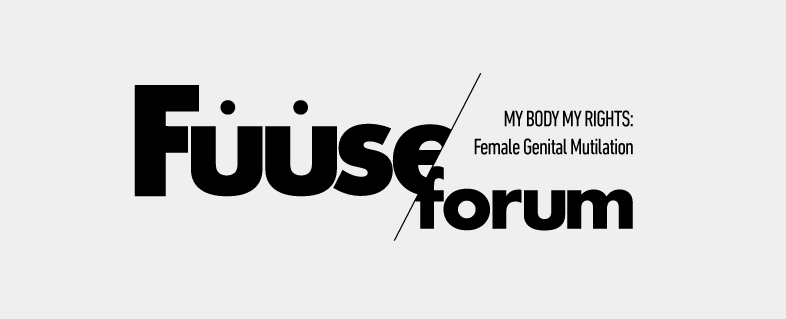
FUUSE FORUM: MY BODY, MY RIGHTS – FEMALE GENITAL MUTILATION
3rd of December from 18:00 – 21:30 at Litteraturhuset (WERGELAND Room)
This is a free event, visit this link to REGISTER ONLINE NOW
ABOUT FUUSE
Fuuse is an Emmy and Peabody award-winning company founded by Norwegian artist and activist Deeyah Khan. Fuuse works to bring about urgently needed dialogue and social change towards a culture of human rights, gender equality, freedom of expression, social justice, inclusion and peace.
Fuuse launched Fuuse Forum, its series of dialogue events in September 2015. Fuuse Forum is a platform for open exchange on the most demanding issues that our society faces today. Fuuse Forum encourages the interchange of various vantage points through bringing forward hidden, alternative and excluded perspectives in an atmosphere of plurality and respect. Fuuse Forum cultivates this multiplicity of opinions to develop rounded understandings and practical recommendations relating to crucial current issues.
My Body, My Rights – Female Genital Mutilation is the 3rd forum of this series.
INTRODUCTION TO FUUSE FORUM: MY BODY, MY RIGHTS – FEMALE GENITAL MUTILATION
by Deeyah Khan
As a woman who has the benefits of a dual identity, combining a South Asian ancestry with a Scandinavian upbringing, I have always been preoccupied with exploring the various issues and contrasts arising within our intercultural societies. My work confronts the most problematic of these clashes. One of these is the issues around the control of women’s bodies, which can be expressed in many ways including forced marriage and ‘honour’ based violence. One of the most brutal forms of controlling women’s bodies and sexuality is female genital mutilation, a phenomenon in which the genitals, often of little girls, are cut as a preparation for womanhood and marriage. There are a range of different types: in some cases, the clitoris and labia are removed; in others, the genitals are stitched together leaving just a small orifice. The whole area may be ‘reopened’ upon marriage. The conditions and instruments of the cutting of girls are often unsanitary and infections and haemorrhage are common side-effects. In all cases, there are severe health consequences, from fistula to difficulties in childbirth.
There are several superstitions that reinforce these traditions: some believe that FGM increases fertility, that it increases men’s sexual pleasure, that it is ‘cleaner’, or that it is required by religion and that this mutilation of girls will keep them from acting on or feeling any sexual desire, thereby protecting the family and the men from any ‘shameful, immoral or promiscuous behaviour’ by the girl. These beliefs can be very strong, and community pressure to conform can be intense. In most cases, parents genuinely think that they are doing the right thing for their daughters and granddaughters. This can make confronting the issue very difficult.
For many years, the problem has been treated as almost too delicate to address: while laws may be changed, prosecutions rarely follow. More importantly, the necessary safeguarding and prevention measures in schools and in systems of healthcare are underdeveloped. This complacency has been partly justified by a wish to avoid upsetting the sensitivities of minority communities. However, a new generation of activists are leading the battle from inside their own communities, bringing a new urgency and passion to combatting this form of violence against women. The activists taking part in this Fuuse Forum represent this courageous new wave of anti-FGM activism, developed by women within the affected communities, standing up for their rights over their own bodies against the weight of tradition and identity. My hope is that we can use these experiences to develop deeper understandings and more practical solutions to dealing with the issue of female genital mutilation.
In developing Fuuse Forum, I wanted to create a series that takes a fresh and compassionate take on the pressing issues of our age, featuring speakers and viewpoints as diverse as the societies we live in today: encounters that bring together disparate voices with a common concern for our shared future, which includes sensitive issues such as FGM. We will have to learn together to live together.
SPEAKERS
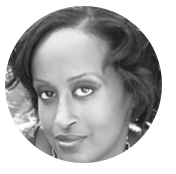 |
Leyla Hussein Leyla Hussein is a trained psychotherapist and a multi-award winning campaigner on FGM and gender rights. She was included in the BBC 100 Women list in 2013 and is included in Debrett’s 500 list of most influential people in the UK. She co-founded Daughters of Eve, an organisation working to protect girls and young women at risk of FGM. She advises the UK-wide Tackling FGM Initiative, the Desert Flower Foundation, and the Honor Diaries organisation. She sits on the board of directors for Safe Hands For Girls, a non-profit organisation working with survivors of FGM based in the US and the Gambia. Leyla is now a consultant for The Girl Generation programme and is the Chief Executive of Hawa’s Haven. Leyla Hussein is also a Community Facilitator at Manor Gardens, where she now runs the Dahlia Project, the only counseling service for FGM survivors in the EU. Her documentary “The Cruel Cut” which aired on Channel 4 in the UK was nominated for a BAFTA in 2014, The Amnesty Media Award 2014, Best Onscreen Talent category for the CDN Awards 2014 and the Broadcaster Award 2015. Her work has triggered a much needed debate in Parliament on FGM in the UK in which she has been a major influence. Leyla blogs at the Huffington Post, Cosmopolitan Magazine and The Guardian. She is also a guest lecturer on women and girls’ rights, and has spoken at Universities across the UK and US as well as many national and international human rights conferences. |
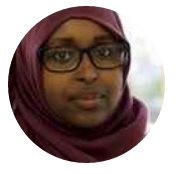 |
Muna Hassan Muna works for Integrate Bristol as their lead outreach worker on FGM and a co-founder of YouthForChange. She was part of the core group that started the work around FGM at Integrate Bristol, which has been recognised nationally and internationally for its grassroots activism. While working with the charity she has been invited to speak at several conferences at Cambridge University, Royal College of nurses and midwives and has chaired a national conference which discussed best ways in preventing FGM, while supporting survivors of the practice. She is currently studying towards a degree on childhood development at university, and seeks to carry on with further studies. |
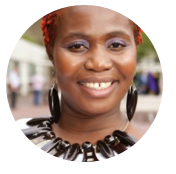 |
Sarian Karim Kamara Sarian Karim Kamara is a Community Development worker, Community facilitator, an activist and anti FGM campaigner. Sarian works as a community advocate for Forward UK and Manor Gardens Health Advocacy Project in community-level prevention work on FGM in the UK. She also works closely with the Metropolitan Police across London and beyond, to educate, support and engage with communities and professionals. Sarian has provided a great deal of training including understanding FGM and its consequences, health improvement, safeguarding children and the UK legal position upon FGM. Sarian works within communities, campaigns and facilitates workshops, trains professionals and raises awareness amongst affected communities. She now runs workshops every fortnight in South East London engaging communities on the topic of FGM, empowering them to challenge FGM and supporting women affected by FGM to access specialist services. |
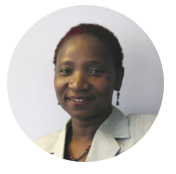 |
Janet Fyle Janet is a practicing midwife and currently works at the Royal College of Midwives as Professional Policy Advisor. She is chair of the Mary Seacole Steering Committee, and has served on international boards. She is currently on the Board of Directors for charities including Best Beginnings, and the Desert Flower Foundation. Janet has a breadth of experience and works with a variety of stakeholders including the UK government, NGOs and professional bodies, to lobby and campaign for change in the interest of disadvantaged groups and women and children. She has been an advocate and played a leading role in national campaigns which include Ending Violence and Abuse against Women and Girls, her work on FGM, campaigning on behalf of asylum seekers, women in prisons and for action to end child marriage, forced marriages, and human trafficking, and issues relating to health and gender inequalities. Janet is a coach and mentor to many campaigners and health professionals, helping them to find their voice and actively participate and challenge those discussions and practices which impact us all both within the NHS and development sector. |
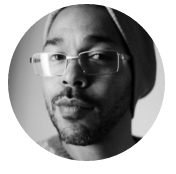 |
Kwame Lestrade A London-based producer and director and owner of Franklyn Lane Films, Kwame made a short film called ‘Calm’ focusing on 16 year-old Miranda and her father who sends her to be cut. Based on a true story, the film is now screening at festivals internationally and was nominated for an AMAA for Best International Short in 2015. Whilst working on new projects, Kwame is still responding to the impact of a film dedicated to the subject of FGM, sharing insights learned during the research phase of pre-production, and most importantly, what it means to be a man actively engaged in subjects that are considered to be women’s issues. |
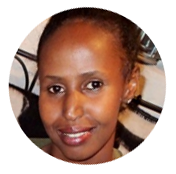 |
Kadra Yusuf Kadra Yusuf is a journalist, writer and feminist. In 2000 she made a documentary film exposing FGM in Norway’s African community which was the recipient of the Fritt Ord Honorary Award. Using undercover filming, she was able to record religious leaders supporting the practice. Kadra’s documentary was an important step in the development of Norway’s response to FGM in the country. It led to the development of an action plan, which included an information campaign, which raised awareness of young people, and worked with health workers so that women who have undergone FGM will receive appropriate treatment for their obstetric and gynecological needs. |
PROGRAMME
| Time | FUUSE FORUM MY BODY MY RIGHTS – FEMALE GENITAL MUTILATION |
|---|---|
| 18:00 | |
| 18:05 | FGM in Norway |
| 18:15 | The Cruel Cut (documentary film screening courtesy of Love Productions©) |
| 19:05 | My Story: Leyla Hussein |
| 19:25 | BREAK |
| 19:40 | Finding my strength: Sarian Karim Karama |
| 19:55 | Group discussion with Leyla Hussein, Muna Hassan, Sarian Karim Kamara, Janet Fyle, Kwame Lestrade and Kadra Yusuf Q & A from the audience Summary and thanks (Leyla and Deeyah Khan) |
| 21:00 | END |
This is a free event, visit this link to REGISTER ONLINE NOW
For any questions contact: info@fuuse.net

